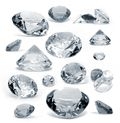Are Your Rough Diamonds Kimberley Process Certified?
Are Your Rough Diamonds Kimberley Process Certified?

Almost everyone loves a diamond whether it’s been cut and polished or still in its rough form. However, those beautiful diamonds can go through an involved process before they are sent to your local jewelry store. If you have seen the movie Blood Diamond, Leonardo Dicaprio and Djimon Hounsou worked together to recover a rare pink diamond. During the movie a war is taking place, Djimon Hounsou has been taken from his family to work in the diamond fields, and even his young son was taken from him to fight in the war. Did you know issues like this are still happening today? In some countries rough diamonds are used to fund causes such as civil wars, fund rebel movements to undermine or overthrow governments, and contribute to human rights violations. Diamonds originating from countries committing actions such as these are called conflict diamonds.

The Kimberley Process Certification Scheme (KPCS) was introduced in 2003. It is an international certificate based system that controls the flow of the rough diamond trade. Its aim is to prevent the trade of conflict diamonds. Today, there are 75 countries, including the United States (U.S.), which have joined together and agreed to participate in the KPCS. By their involvement, they have agreed to trade only amongst other countries participating in the KPCS. According to Diamondfacts.Org, more than 99% of the rough diamonds are from conflict free sources and traded under the KPCS.
So, how does the U.S. do its job to ensure that rough diamonds imported or exported are conflict free? The U.S. implemented the Clean Diamond Trade Act of 2003 that commits the U.S. government to the KPCS and instituted the structure of how the U.S. government will put this process into effect. Also, there are the Rough Diamond Control Regulations which provide legal obligations that importers and exporters in the U.S. must adhere to when trading rough diamonds. If importers and exporters violate these laws, the U.S. government will issue fines and penalties to violators. The Clean Diamond Trade Act also states the KPCS is an ongoing process and the U.S. government will continue to strengthen the KPCS and monitor its effectiveness.
The KPCS not only helped many countries to legitimize the trade of rough diamonds, but it minimized other rebellious movements globally that could have caused protest against the purchasing of diamonds. These protests could have caused a negative impact on the U.S. economy. So, the next time you decide to purchase a diamond just ask your jeweler, “are your diamonds Kimberley Process certified?”
For more information, stay tuned for the next blog or you can visit //www.state.gov/e/eb/tfs/tfc/diamonds/index.htm



